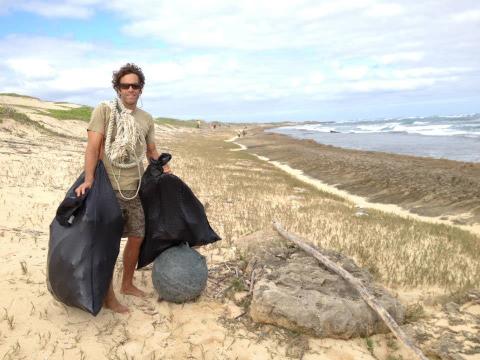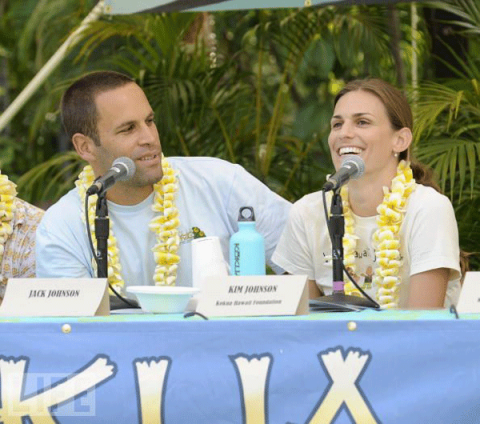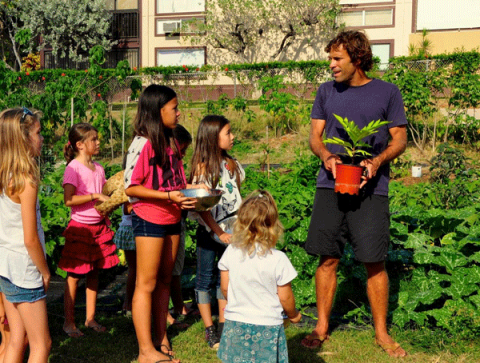
“For me it just came naturally and charity was something my wife Kim and I wanted to do as a couple,” a candid, laidback Johnson tells Samaritanmag from his Oahu homestead.
Together, the Johnsons operate two non-profit Foundations: the Kokua Hawai'i Foundation, which has promoted environmental education in the schools and communities of Hawaii since 2003, and the Johnson Ohana Charitable Foundation, created in 2008, which supports organizations worldwide that have strong community involvement and a solutions-based approach to environmental, art and music education. To date, Johnson reckons the two Foundations have raised some $25 million.
“We’ve met other people along the way that have really inspired us, like David Crosby and his wife (Jan Dance) and Neil and Pegi Young when we did the Bridge School Benefit — those using their marriage as a partnership that can use music for activism,” Johnson says.
Since 2008, Johnson has directed 100 percent of his touring proceeds to charity while aggressively pursuing green alternatives to traditional rock ‘n’ roll outings. His current theatre tour in support of his sixth studio album, From Here to Now to You, emphasizes “recycling, composting, and other waste diversion efforts to reduce the amount of waste headed for the landfill,” the singer writes on his website.
It also boasts a charity auction component that allows Johnson to raise even more money through fan-sponsored meet-and-greets, while shining the spotlight on local, hand-picked non-profits advocating for sustainable local food systems and plastic-free initiatives through the grassroots All At Once social action network.
What’s more, the Johnson Ohana Charitable Foundation has pledged to match every dollar donated to All At Once’s non-profit partners for this tour, up to $2,500 per group.
Then there is the plethora of charitable one-offs: a gig supporting Farm Aid in Pennsylvania last September; Johnson’s $50,000 donation to Hurricane Sandy relief in 2012; another $50,000 to GlobalGiving's Japan Earthquake and Tsunami Relief Fund in 2011 and so on.
That Johnson makes it all look so effortless — while continuing to churn out winning folk-pop songs – makes his efforts quite inspirational. There are always ways to make an impact, inspire change and be a business and charitable at the same time.

“A lot of times just before I go to bed I will say something and the next morning she will hold me to it and start making lists. So I take full responsibility for it — like when I say, ‘Hey, next time we tour let’s make a fundraiser out of it,’ she is really smart about it.
“But in some ways it’s been kind of nice that this has become a bit of a career, something I can put more time into. It’s nice to show my three kids what Dad does for a living — I play music to gather people together and use all that energy and finances to focus on things that are important to me.”
Environmental issues are cornerstone to Johnson’s agenda. His website lists multiple ways his tours reduce the carbon footprint using “sustainable biodiesel to fuel tour trucks, buses and generators throughout North America” for example, while encouraging fans to walk, bike or carpool to gigs.
“As part of a farm to stage catering program, Jack Johnson tour crew will work directly with local farms and purveyors across North America to source locally grown organic foods. All disposable cutlery and tableware is biodegradable,” the website adds.
Yet Johnson says that education — albeit with a focus on the environment — is at the heart of both the Johnson Ohana Charitable Foundation and the Kokua Hawai'i Foundation.
For example, through the Johnson Ohana Charitable Foundation, Jack Johnson’s 2010 To the Sea tour also partnered with over 220 non-profit partners to educate fans at every concert about plastic-free initiatives, sustainable local food projects, and other environmental issues.
“My wife was a teacher for four years — she has a Master’s degree in education — and I stole her away to be my tour manager,” Johnson says. “But she always wanted to get back into education. So I think the focus on education comes a lot from that.
“I went to public school in Hawaii, and so do my kids, and you see all the art and music programs being cut. So I felt that was an important thing to focus on. But environmental issues are always important.”
When they started the Kokua Hawai'i Foundation in 2003, it was focused on environmental education in the schools, he says.
“That was at a time when we didn’t have curbside recycling in Hawaii and we helped with a lot of groups that were kind of pushing for that. We started recycling programs in the schools — little microcosms of how it could work. That was a fun way to start the conversation.
“So a lot of the schools we had relationships with through the recycling then became involved in farm-to-school programs; connecting kids with their food at a young age, starting little gardens at the schools and taking them on field trips out to farms — things like that. Environmental work is important everywhere, but in Hawaii, it’s essential. Apart from the fact that I grew up here, 90 percent of our food is shipped in.

Of the music charity aspect, referencing another focus of the Johnson Ohana Charitable Foundation, Johnson explains “music has done so much for me and my life. It brings me so much joy to play music with my kids. We are fortunate to have instruments lying around the house, to have that opportunity. So funding these programs where space is donated for after-school programs and kids can have instruments, it kind of reminds me of that movie, School of Rock.
“I’ve gone and jammed out with the kids and a lot of times if they know I am coming, they will learn one of my songs. And it’s great to see the smiles on the kids’ faces when they have a place to go to pick up an instrument after school.”
As for how the Foundations manage the $25 million raised to date, Johnson says, “It’s always a bit tricky to explain.
“Along the tour we give out money to local, non-profit groups in each town and that could be $2,500 to $5,000 to each group, and there might be five to 10 groups at each show. So by the end of the tour we’ll give out a portion of the funds raised, but the majority of funds are still left over. So we take those funds and put them into an endowment so each Foundation can live off the interest.”
According to its web site, the Johnson Ohana Charitable Foundation has distributed over $2 million to over 300 non-profits to date.
“So $25 million is how much we have put away for the Foundations to exist,” says Johnson, “and then what we give out per year has more to do with how we can make them sustainable financially. We give out a certain amount in grants every year. What we started realizing through conversations with our boards was ‘Where is this interest coming from and what are we doing with it?’
“More and more we are trying to focus on how we invest the money and making sure our investments match the mission of what our Foundations are trying to do. For instance, we don’t want to be making our interest from high-fructose corn syrup if we are focusing on child nutrition. The next step are these PRIs – project-related investments – which invests money into farms, for example, to make sure investments make sense with our mission.”
All of which ensures Johnson is bound for the history books as a supreme and highly effective example of a musician of conscience. Online charity watchdog group looktothestars.org – which monitors celebrity giving – lists no fewer than 23 additional organizations that have benefited from Johnson’s efforts, among them Amnesty International, Cystic Fibrosis Foundation, Red Cross, Live Earth and Heal the Ocean.
Yet asked whether he thinks colleagues in the performing arts do enough to help charity, Johnson is surprisingly equivocal.
“I don’t know the answer to that,” he says. “Obviously some people feel the responsibility. I do.
“I mean, I never imagined this is what I’d be doing with my life, so giving back just felt like the right thing to do, the best way to direct that energy, whether it’s the money you’re raising or just the number of people who come to the shows that we can direct towards groups doing good things in each town.
“At the same time, art is art. I can hear great music and I don’t necessarily care if that person uses their celebrity to promote something else.”
トレンチコート コーデ メンズ特集!往年の名優たちも愛したアウターの粋な着こなし&アイテムを一挙紹介 , メンズファッションメディア Reus - ページ 2